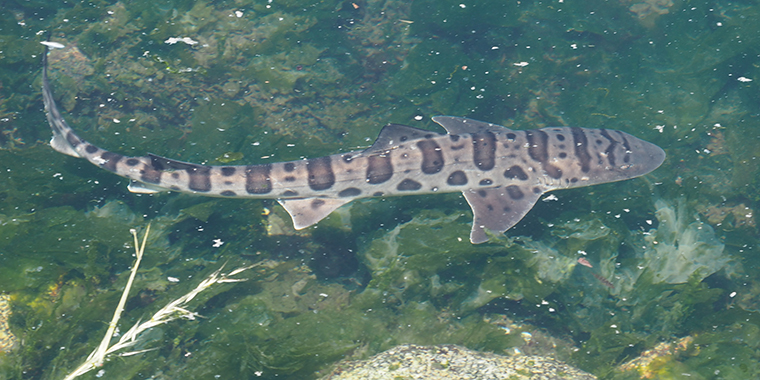For more than three months, hundreds of dead leopard sharks have been washing up on San Francisco Bay's shoreline. Shark experts investigating the mysterious deaths have made progress, but they haven't yet determined the exact cause.

Leopard sharks, small native sharks that do not attack people, have been washing up dead on the San Francisco Bay shoreline. Photo by J. Maughn-FlickrCC
BY SEJAL CHOKSI-CHUGH
Published: July, 2017
For more than three months, hundreds of dead leopard sharks have been washing up on San Francisco Bay’s shoreline. Shark experts investigating the mysterious deaths have made progress, but they haven’t yet determined the exact cause.
Leopard sharks are small, three to five feet long, and do not attack people. They live in the Bay and along the California coast and are a key part of the Bay’s food web. The sharks are a food source for seals and sea lions, and people occasionally catch them for sport and eat them, too.
Dead leopard sharks first began washing up along the South Bay shorelines of Redwood City and Foster City after heavy rains earlier this year. Shark deaths were later reported along Hayward, Berkeley, Oakland, San Francisco and other areas of the Bay. Sharks held captive in a South Bay aquarium that uses filtered Bay water also had symptoms similar to those of wild sharks.
One suspected culprit is a fungal disease found in the tissues of some dead sharks, according to Dr. Mark Okihiro, a pathologist with the California Department of Fish and Wildlife. The infected sharks become confused and swim aimlessly before either sinking to their death or beaching themselves. This indicates a disease that attacks their brains.
The fatal disease may have first struck when leopard sharks left the deep Bay waters, where they spend most of the year, and moved into shallow areas for the spring birth and breeding season.
Fungal pathogens bloom in shallow water, and heavy rain can spread the blooms. Changes in the saltiness of water can also weaken leopard sharks. So the exceptionally wet rainy season this year may have delivered a one-two punch for the Bay’s shark population. The rains diluted the water’s salt levels in shallow areas, making the sharks more susceptible by weakening their immune systems, and the rains also spread the harmful fungus more widely.
Usually, leopard sharks move quickly into saltier water when they’re in areas that aren’t salty enough. But fish and sharks can sometimes get trapped behind tide gates in shallow breeding waters. Tide gates are operated by shoreline cities to prevent flooding of low-lying areas. The gates are closed during low tide, while the water is shallow, to prevent the high tide from coming in later and flooding the shoreline.
This year, if sharks were trapped behind tide gates in shallow waters during breeding season, they could have been trapped in water that wasn’t salty enough because of heavy rain. The rains could have also led to those waters being abnormally concentrated with high levels of pollution. After years of drought, a load of accumulated pollutants, including heavy metals, pesticides and oils, got washed into the Bay from paved areas.
To keep wildlife from getting trapped in possibly fatal conditions, Baykeeper is advocating for shoreline communities to install a new type of tide gate that allows fish and sharks to escape back into the Bay. Our scientists and staff members also continuously monitor pollution and work to strengthen and enforce clean water laws to reduce pollution in the Bay. To learn more about Baykeeper and our work for a healthier San Francisco Bay, visit us at baykeeper.org.
You can also help shark scientists pin down what’s killing the Bay’s leopard sharks. If you see a shark stranded on the shoreline, don’t try to push it back in the water. Report its exact location to Baykeeper’s hotline at (800) KEEP-BAY ((800) 533-7229) and send photos to hotline@baykeeper.org, or call the California Department of Fish & Wildlife at (415) 470-7171.
Sejal Choksi-Chugh is the executive director of San Francisco Baykeeper. Baykeeper uses on-the-water patrols of San Francisco Bay, science, advocacy and the courts to stop Bay pollution. To report pollution, call Baykeeper’s hotline at 1-800-KEEP-BAY (1-800-533-7229), e-mail hotline@baykeeper.org, or click “Report Pollution” at baykeeper.org.

